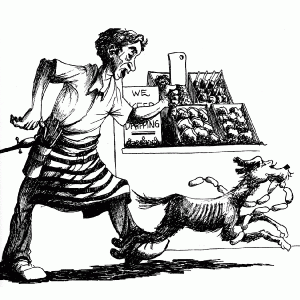By Justin James Zablocki – 2013
What makes a riddle what it is? We hear the word thrown around on a daily basis on TV and on news websites when they are referring to anything unknown. We hear it when people are talking about punny questions: What time do you go to the dentist? You go at tooth-thirty. Finally we hear them in the most definitive way, when there is a question or a statement that has a veiled meaning and is posed as a question. This means it demands an answer. All of these uses have become culturally exceptable across the globe and the word riddle seems like it is growing into this massive term that encompasses anything that is not completely understood. Riddles haven’t always had such an uncertain definition, but it has changed to better fit the needs of a growing and more global world.
Riddles have existed and been popular for thousands of years. They predate the writing of the bible and the Greek empire. Both the bible and Greek literature contain them and the writers seem to be somewhat familiar with them. This means that riddles and the concept of riddles are at least 1000 years old. One riddle has its roots in a math problem from 1650 BC, but the riddle itself was written much later. The original problem was meant purely as a math problem, not a riddle. To people of these time periods riddles were essentially metaphors or just questions/statements with hidden meaning. Aristotle described them as being useful in philosophy because they can explain concepts indirectly that could not otherwise be explained.
The next great age for riddles was the Anglo-Saxon time period (5th to 12th century). During this time riddles almost degraded in meaning. Most of the riddles of this time would be what we now call what am I riddles. Many of these riddles don’t survive to this day but many of them do. The greatest source of riddles from this day is the Exeter Book. This book contains 94 riddles from the time period, one of the greatest historic collections of riddles. Unlike the Greeks, the Anglo-Saxons viewed riddles as entertainment rather than useful to philosophy.
From this point until modern times riddles have primarily meant the same kind of what am I riddle that was so popular in Anglo-Saxon times. A natural linguistic process in for words to gain meaning or lose it over time. After thousands of years of the word riddle being associated with extremely complicated questions, we associate this with anything that is labeled a riddle. This makes it a very good term to describe great real world conundrums because it makes them feel even more alluring. Questions with puns in them are actually technically riddles because of the several meanings they offer. Even though they have not traditionally been viewed as riddles.
No matter what you call a riddle or what a riddle is they are fun and interesting bits of logic. But with all of this confusion there is one thing we can be sure of: the meaning of riddles is a riddle.
Visit Good Riddles Now for some great modern and old riddles.
Article Source: https://EzineArticles.com/expert/Justin_James_Zablocki/1635976
